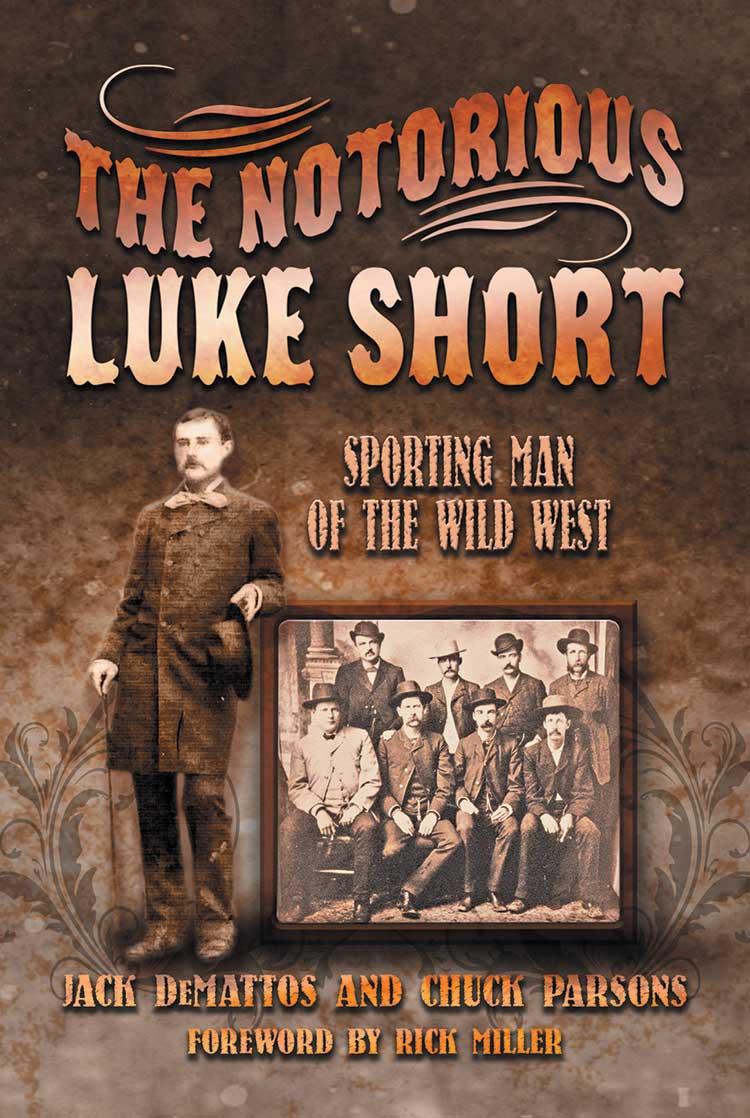The Notorious Luke Short: Sporting Man of the Wild West, by Jack DeMattos and Chuck Parsons, University of North Texas Press, Denton, 2015, $29.95
 “When the legend becomes fact, print the legend,” notes the newspaperman in The Man Who Shot Liberty Valance. Well, Jack DeMattos and Chuck Parsons prefer to print both when they profile notable frontier figures, and Luke Short is their latest case study. After scrupulously gleaning period newspapers, accounts by such contemporaries as Bat Masterson and other reliable sources, the authors chronicle what is known of the life and times of the man. At the same time they compare those accounts against less reliable ones that popped up in Short’s lifetime and progressively distorted the picture thereafter. In so doing, the authors unravel the process of just how historical fact evolves into legend.
“When the legend becomes fact, print the legend,” notes the newspaperman in The Man Who Shot Liberty Valance. Well, Jack DeMattos and Chuck Parsons prefer to print both when they profile notable frontier figures, and Luke Short is their latest case study. After scrupulously gleaning period newspapers, accounts by such contemporaries as Bat Masterson and other reliable sources, the authors chronicle what is known of the life and times of the man. At the same time they compare those accounts against less reliable ones that popped up in Short’s lifetime and progressively distorted the picture thereafter. In so doing, the authors unravel the process of just how historical fact evolves into legend.
The key to understanding Short’s place in Western history lies in his chosen profession as a “sporting man,” or gambler—applicable not only to gaming tables but also to boxing and horse racing. In the early 1880s that profession was not necessarily viewed as shady or seedy, and certainly the dapper Short did not look the part. In that decade, however, authorities in places like Dodge City, Kansas and Fort Worth sought to close down gambling houses and drive their proprietors out of town. As Short often proved when he took his persecutors to court, such actions were often motivated less by moral conviction than by greed and a desire to eliminate competition. Short had a fearsome reputation as a gunfighter and did kill two noteworthy opponents—Charlie Storms and Jim Courtright—but truth be told, he spent far more time and enjoyed more success appealing in the courtroom than trading shots on the street. It was after a negotiated settlement to the Dodge City War that Short appeared in one of the iconic Western photographs when on June 10, 1883, Charles A. Conkling captured “The Dodge City Peace Commission,” consisting of Short, William H. Harris, Bat Masterson, William F. Petillon, Charles E. Bassett, Wyatt Earp, Frank McLean and Neil Brown.
Though Short was never immortalized on stage or screen—save for a small role on the TV series Bat Masterson (1958–61)—his biography might pass for a glimpse of the diminutive historical figure behind the fictional Brett Maverick. Neither the book nor the man it chronicles should be sold short.
—Jon Guttman
Originally published in the December 2015 issue of Wild West.





